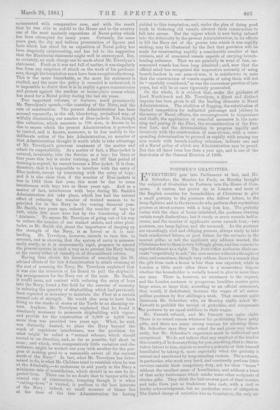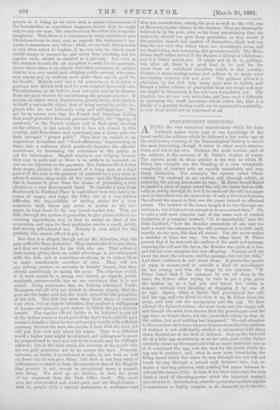POS TMEN'S GRATUITIES. E VERYTHING. gets into Parliament at last, and Mr.
Schreiber, the Member for Poole, on Monday brought the subject of Gratuities to Postmen into the House of Com- mons. A custom has grown up in London and most of the English counties for householders at Christmas to give a small gratuity to the postmen who deliver letters, to the lamp-lighters, and to the turn cocks who perform that mysterious process at street-corners with a long iron key. The gratuity varies with the class of house inhabited, the postmen drawing certain rough distinctions ; but it rarely or never exceeds half-a- crown, and the number of applicants never exceeds four,—two postmen, one lamp-lighter, and the turneock. As the postmen.
are exceedingly civil and obliging persons, always ready to take back misdirected letters, or post letters for the servants in the nearest pillar, or tell the applicant any address wanted, the Christmas-box to them is very willingly given, and has come to be regarded almost as a right. The Post-Office authorise their ser- vants "respectfully to ask," the men receive without a thought of alms, and sometimes, though very seldom, there is a remark that the gift from such a house is less than was expected, while in London a little more often there is a momentary dispute whether the householder is socially bound to give to more than one man. There is, however, no resistance to the request, and the London postmen in prosperous localities receive quite large sums, so large that, according to an official statement, they would, if distributed, increase the wages of all metro- politan postmen by five shillings a week. That amount quite distresses Mr. Schreiber, who, on Monday night, asked Mr. Fawcett to prohibit the receipt of gratuities, and compensate 'the postmen by an equal addition to their wages.
Mr. Fawcett refused, and Mr. Fawcett was quite right. There is no sound reason whatever for prohibiting these petty gifts, and there are many strong reasons for allowing them. Mr. Schreiber says they are asked for and given very reluct- antly, but Mr. Schreiber's experience must be individual and exceptional. We do not believe that any employe of the kind in this country, if he does anything for you, anything, that is, that in- volves labour to him, objects to receive a gratuity or feels himself humiliated by taking it, more especially when the gratuity is annual and sanctioned by long-standing custom. The postmen, in particular, who work very hard, and constantly perform little services outside their compulsory duty, ask for their " boxes " without the smallest sense of humiliation, and without a trace of that sulky furtiveness which marks some other recipients of similar gifts. They think the half-crowns part of their income, and take them just as tradesmen take cash, with a civil or kindly acknowledgment, but no particular sense of obligation. The hinted charge of extortion has no foundation, the only ap- preach to it being, as wo have said, a casual remonstrance if the householder, as sometimes happens, insists that ho ought only to pay one man. The reluctance on the other side is equally imaginary. That there is a reluctance in many quarters to give Christmas-boxes is true, and, as regards the tradesmen's ser- vants, is sometimes very bitter ; while, we are told, the turucock is very often asked to explain, if he can, why he, who is never visible except to passers-by, and never does anything but his regular work, should be entitled to a gratuity. But even in the strictest households an exception is made for the postman, about whom there is an almost unbroken consensus of opinion that he is a very useful and obliging public servant, who earns very scanty pay by walking more miles than can be good for his health. Nobody over saw a fat postman, or, in London, a postman who did. not look as if he were weighed down with care. The reluctance, as we believe, does not exist, and in its absence there are good reasons for maintaining the present practice. It secures an object which Englishmen greatly desire, and which is in itself a reasonable object, that of being served by public em- ploy& who are not habitually surly and self-important. We are by no means sure that the French and American feeling that small gratuities diminish personal dignity, the "dignity of manhood," as the French waiters said in their great meeting on the subject, is not sound; but it does not extend to this country, and.Frenchmen and Americans pay a heavy price for their servants' " proper pride." They have to submit to an ungracious formalism ana. "stand-offishness," degenerating at times into a rudeness which positively impedes the officials' usefulness, by increasing the reluctance of the public to ask for information. English employes are obliging because they may be paid, and as there is no pride to be wounded, we can see no objection to the payment. The Postmen like it better than wages, because the command. of a lump sum at a fixed period of the year is the greatest of comforts to a poor man, to whom it secures shop credit all the year ; and the Department like it, because it gives them the means of promoting a very efficient or a very discontented hand. To transfer a man from Southwark to Portland Place is equivalent to a very heavy in- crease of wages, and helps the Office out of a very serious difficulty, the impossibility of finding prizes for a very numerous staff, whose pay must, in justice to the tax- payer, be kept down to the very lowest market rate. They are able, through the system of gratuities, to give prizes without in- creasing expenditure, and, in fact, to realise au ideal of the economists, and raise for their particular service a small, unfelt, and strictly self-adjusted. tax. Nobody is even asked for the gratuity who cannot afford. to pay it. But then it is alleged, though not by Mr. Schreiber, that the poor suffer for these gratuities. They cannot afford to pay them, and they are neglected for the rich, who can. That notion of their money giving them an unfair advantage is not infrequeut with the rich, and is sometimes so strong as to induce them to make considerable sacrifices of ease. They will not pay railway porters or servants in friends' houses, lest they should unwittingly be taxing the poor. The objection would, if it were sound, be a strong one, indeed, as regards public employ&, unanswerable, but we are convinced that it is not sound. Long experience has, we believe, convinced. Traffic Managers, and all who are forced to observe closely, that the poor are the better and. not the worse served for the gratuities of the rich. The rich buy more than their share of comfort very often, but as regards attention, they produce a willingness's of temper and general good nature by which the poor directly benefit. The regular official dislike to be bothered is got rid
of, the bother comes to be all part of the day's work, and. the poor woman's bundle is lifted for her and carried, usually with sufficient
courtesy, because the man who carries it feels that the next job will pay him over and. above his wages. That in a different world. a higher tone might be obtained, and willingness to assist be proportioned to need and not to its reward, may be willingly
allowed; but as the facts stand, the servants of the public who are not paid, gratuities are by no means the best. Domestic servants, no doubt, if accustomed to veils, do not wait so well
on those who do not give them ; but that is not from want of willingness, so much as from the ingrained idea of the English
that poverty is not, except in exceptional cases, a respect-
able thing. We need go no farther, in fact, for proof of our argument than the Post Office itself. The post- men are over-worked and under-paid, and. are Englishmen— that is, people with a natural inclination to surliness—and they are, nevertheless, among the poor as well as the rich, one of the most popular classes in the country. They are thoroughly believed. in by the poor, who, so far from maintaining that the well-to-do should not give them gratuities, as they would. if the practice caused. any neglect of themselves, think and say that the few rich who refuse them are exceedingly mean, and are diminishing, not increasing, the general comfort. The Mews thinks itself better served if the Square is liberal at Christmas, and, it is better served, too. It ought not to be so, perhaps, but, after all, there is a good. deal to be said for the queer form of undefined Socialism which, in this country, dictates so many arrangements, and softens iu so many ways the relation between rich and poor. The guineas given to a physician by the rich help many poor men to health, and. though a better scheme of graduation than our rough and. easy one might be discovered, it has not been formulated. yet. The English, too, are not very articulate, and. have such a difficulty in managing the small amenities which soften life, that if a kindly or a grateful feeling could not be expressed in a gratuity, it very often would not be expressed at all.



































 Previous page
Previous page